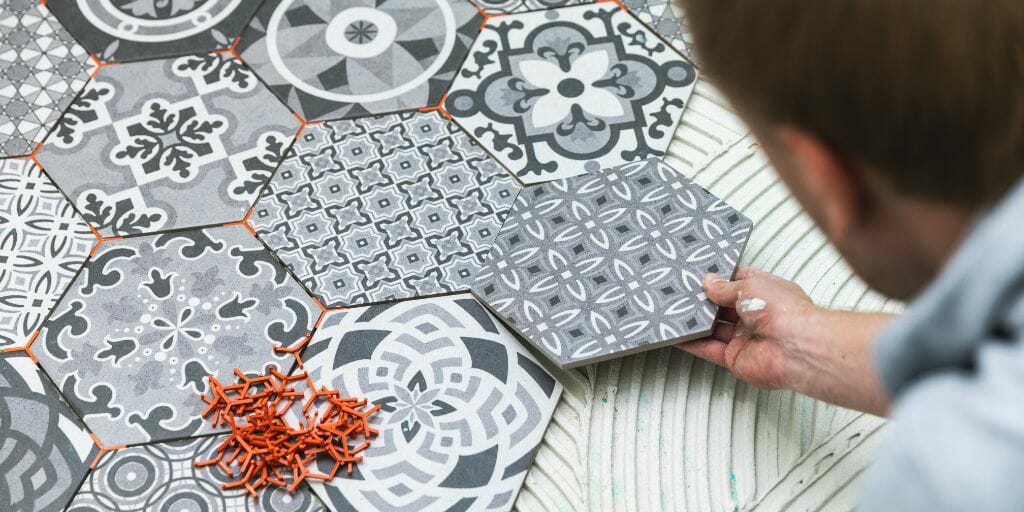When it comes to bathroom renovations, one of the biggest decisions is choosing the right flooring. The bathroom is a high-moisture area, prone to spills, splashes (particularly if you have young children!), and steam, so it’s essential to select a flooring material that can withstand these conditions while also keeping with the style you enjoy in your home.
In this blog, we’ll explore the pros and cons of various flooring options, as well as giving you our expert recommendations, helping you to make an informed decision for your bathroom renovation.
Porcelain tiles
One of the (if not the most popular!) choices for bathroom flooring is porcelain tiles. They are extremely durable, non-porous, and resistant to water, stains, and scratches. These multi-talented tiles are available in a wide range of colours, patterns, and textures, including options that resemble natural stone or wood. Porcelain tiles range from high gloss to non-slip porcelain so it’s important to choose your finish carefully. High gloss is unsurprisingly quite slippery when wet, whereas a proper non-slip tile will be very hard to keep clean.
These tiles also work well with underfloor heating systems, providing a cosy atmosphere in colder months. Bear in mind that without heating or bathroom appropriate rugs, they can be quite cold underfoot.
Although porcelain tiles can be more expensive than other options, their longevity and low maintenance make them a worthwhile investment and can even save you money in the long run.
Ceramic tiles
Whilst not as popular as porcelain tiles as they are more likely to crack, ceramic tiles are water-resistant, and available in a wide range of colours, patterns, and sizes – so you’re sure to find something you love, no matter your design preferences!
Ceramic tiles are also relatively easy to clean, making them an excellent choice for busy households. Like porcelain tiles, they can be cold and hard underfoot, so you may need to consider installing underfloor heating or using rugs for added comfort. They can also become slippery so may not be the best choice for young children or older adults unless you put down anti slip rugs.
Vinyl flooring
Vinyl flooring has come a long way in terms of style and durability. It is an affordable and water-resistant option that can mimic the look of other materials, such as wood or stone without any of the commitment to the upkeep that materials like wood need.
Vinyl is available in sheets, tiles, or planks, so you can easily find what best suits your bathroom. It’s also soft and warm underfoot, making it a comfortable choice. On the downside, vinyl can be susceptible to scratches and dents, especially if you’re placing heavy bathroom furniture on it.
With this in mind, it’s important to choose a high-quality product for better durability. One of our favourite vinyl flooring brands, and one we stock is Karndean. Beautifully designed and very durable, it comes in a range of stylish designs to suit every household.
Engineered wood
If a wood effect floor just isn’t going to cut it and you desire the warmth and elegance of real wood in your bathroom, engineered wood flooring is your best bet. Unlike solid hardwood, engineered wood is made of multiple layers with a top layer of real wood and a moisture-resistant core. This construction allows it to withstand moisture and temperature fluctuations better.
Engineered wood is available in various finishes and wood species, adding a touch of sophistication to your bathroom. Remember to apply a suitable finish or sealant to protect the wood from water damage and keep in mind that this maintenance will be required on a regular basis. If you don’t fancy the commitment of this, it’s best to stick to wood effect flooring instead.
Natural stone
If you want to create a luxurious and timeless bathroom, natural stone flooring can add that touch of elegance you’re looking for! Marble, granite, and limestone are popular choices, but they require regular sealing to prevent water damage and staining.
Keep in mind that natural stone can be more costly too, and some types may be more susceptible to moisture damage than others. It’s essential to choose a stone that’s suitable for bathroom use and consider the maintenance requirements and costs before making your decision.
Need more help to decide which bathroom flooring is best for you? Contact us or pop along to our showroom in Coventry for some personalised advice!

